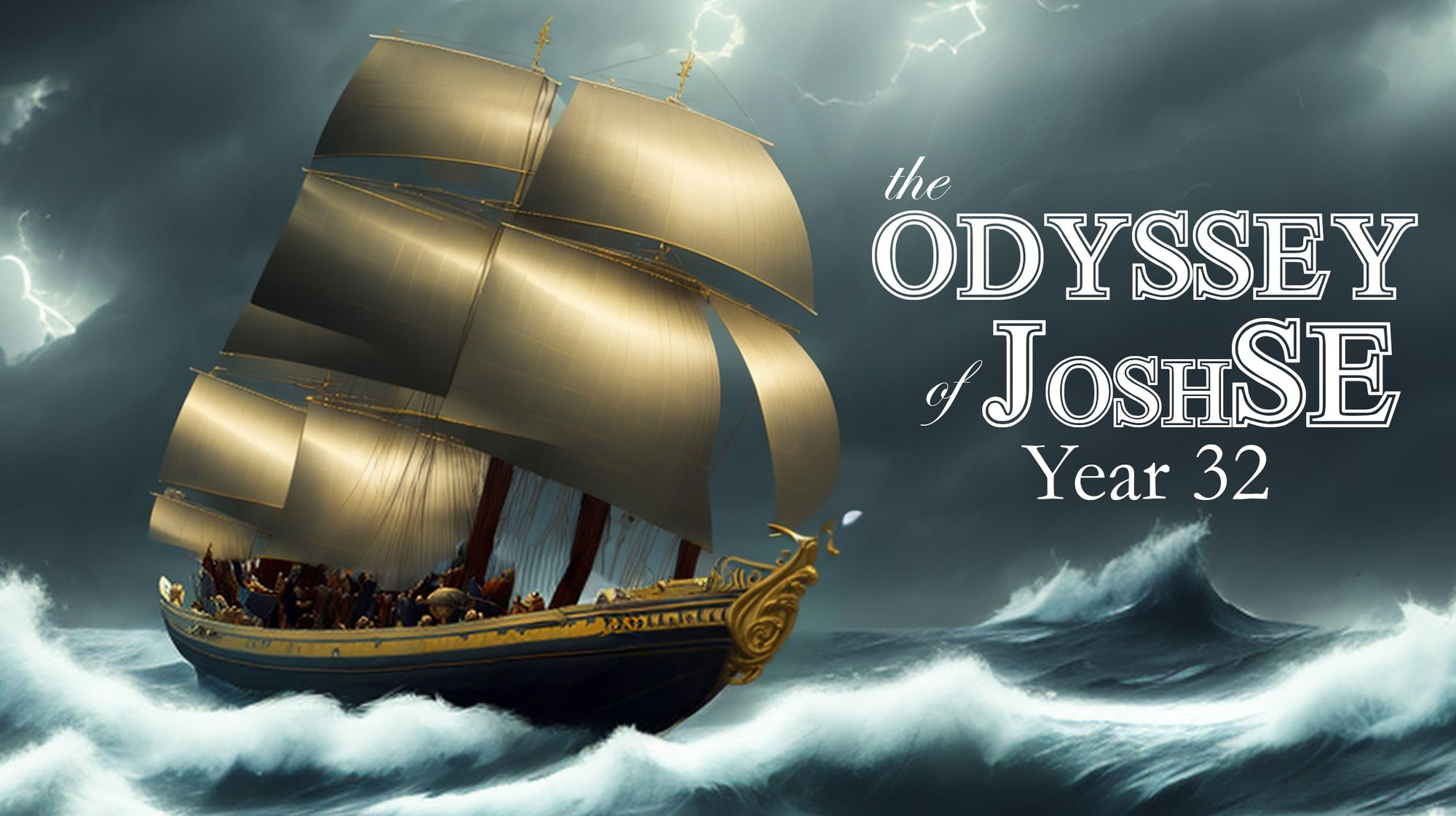My 32nd year walking this Earth is over, and what a year it has been! Both good and bad (so much good! And only a little bit of bad, in my case. #blessed).
There's an absurd amount to cover in this year's annual retrospective-slash-prospective. That's a mouthful, isn't it? Actually, last year we called it Year 31 // Goals & Projects, following the convention set by the original. But that's a terrible name, so we're trying something new again: The Odyssey of JoshSE!
I know, it doesn't roll off the tongue quite like State of the Sanderson — so pomp! so official! — but I rather like the sound of it anyway. It sort of rhymes, I you try hard enough and believe in yourself. Besides, I, like many other writers, have likened this whole endeavor to a journey or an adventure. Odyssey is not so different a word, but it calls to mind the specific trials our hero faced throughout his long voyage.
The cyclops, the sirens, Scylla and Charybdis—the Odyssey is defined by the struggles the hero overcomes. They're what define the hero himself. There is no glory except by surmounting the insurmountable. There is no joy without sorrow. No light without dark. No Archefire without Archedark.
But more on that later. Looking at my notes, much later, evidently. Like I said, an absurd amount to cover in this post. I've provided you a table of contents in case you want to skip to the good bits. I'll try to keep each one as brief as possible so this doesn't become the 10,000-word post it could so easily spiral into!
Table of Contents
- SPFBO9 bundle giveaway
- Writing statistics
- Goal assessment
- New goals
- Sibling Suns 2 delay
- Grave of the Waiting hiatus
- Financial transparency
- Archefire and Archedark
SPFBO9 Big Indie Fantasy Bundle Giveaway
If you interact with the indie fantasy community, you must know the Self-Published Fantasy Blog Off (SPFBO) is now running for the 9th year straight. Community buzz is off the charts – the contest filled its 300 spots in a record 41 minutes (down from 9 hours last year), and the competition is incredibly fierce this year.
An Ocean of Others is in the running along with many other amazing books, and a few of us have partnered up to put together a giveaway for you!

We'll be running the giveaway until June 15th, whereupon 5 lucky winners will win a copy of all 10 eBooks! All you have to do is click the link, answer a question on the Google Form, and you're in the running!
Writing Stats
Full disclosure: Last year I went overboard with the data dump, giving you pivot tables and charts and regular tables and more charts and...it was just too much. I'll simplify it this year. A timeline of events, one table, and one chart. We'll start with the timeline – know that while it doesn't say so, significant time each month (usually 5-10 days) was spent preparing for each monthly release of Grave of the Waiting. We'll talk about that more in a later section.
Timeline
- June 2022 - August 2022 – Marketing and distribution prep for An Ocean of Others release // Continued writing 1.0 draft of Grave of the Waiting
- September 2022 – Release of An Ocean of Others and all the marketing attention I could provide while also preparing for my wedding
- October 2022 – Finished 1.0 draft of Grave of the Waiting
- November 2022 – Began writing 1.0 draft of Sibling Suns 2
- December 2022 – Very little writing this month, only the monthly revisions for Grave
- January 2023 - March 2023 – Significant progress on 1.0 for Sibling Suns 2
- April 2023 - May 2023 – Very little writing for both of these months
Key Metrics
| Year 31 | Year 32 | |
|---|---|---|
| Total Words | 132121 | 209212 |
| Total Hours | 482.65 | 461.50 |
A pretty significant improvement in my word count this year, but that was to be expected since so much more time was spent on first drafts compared to the prior year. It's hard to compare since both years had very different goals. Still, I'm happy with this!
/* Note: Total Words includes only those written during the drafting or editing stage for Grave of the Waiting or Sibling Suns 2. Total Hours includes all time spent doing anything writing related, e.g. sending emails, marketing, graphics work, and of course writing.*/

Goal Assessment
Goal 1 – Finish the first draft of Grave of the Waiting – SUCCESS
Last year I estimated Grave of the Waiting had about 78,000 words to go and hoping to finish by the end of 2022. That turned out to be an overestimation – I finished it in October with only 64,400 more words, setting myself up to start Sibling Suns 2 during NaNoWriMo and get a significant head start. I began in November rather than January, so things were looking up. And yet...
Goal 2 – Finish the first draft of Sibling Suns 2 – FAILURE
You probably noticed that 3 of the months in the timeline had very little writing progress: December, April, and May. Those were simultaneously months that I needed to make a lot of progress yet also months during which I desperately needed a break from writing, for reasons I'll go into later. If I had continued writing as much during those months as I did in the January to March stretch, well...
I would have another ~50,000 words down but still wouldn't have finished the book. In last year's post I estimated it would be 120,000 words in total, which frankly seems like an insane estimate to me. I don't know what I was thinking – the book has 3 POVs, two more than An Ocean of Others, which is 135,000 words. I must have been off my rocker while writing that section.
As it stands, the book is 50% complete according to my status tracker. If that's accurate, we're looking at a potential 180,000-word first draft. 😱 That's terrifying, to be honest. I don't want the book to be that long, so I'm expecting the second draft to largely be a painful cutting process.

But if there's one thing looking back at my previous word count estimates has told me, it's that I am terrible at estimating word counts. Seriously, I feel like I have to revise it every month. I'm going to try not to even guess about these anymore. Instead, I'm sad to say I'm taking a page out of George RR Martin's playbook. New estimate: "The book will be done when it's done."
New Goals
For once, I'd actually like to complete all my goals, so this year I'm keeping it simple. Only one goal:
Goal 1 – Publish Sibling Suns 2
There's still a ton of work left to finish the project, but it's moving along! I've got two beautiful maps commissioned that I'm excited to show off soon, more character art coming down the pipe, and I'm scheduled for cover art and editing in a few months. Things are happening!
Really, the only thing moving more slowly than I would like is my writing. So let's talk about that.
Sibling Suns 2 Delay
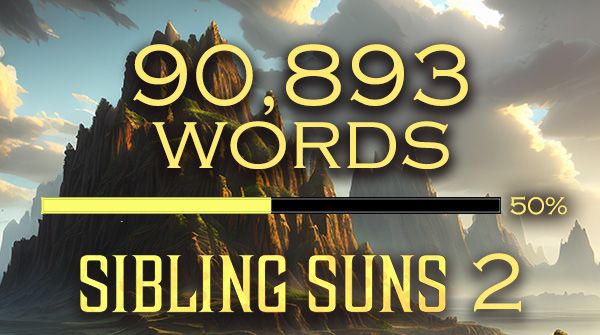
I've said for a while now that I wanted to publish this book in 2023. In some alternate universe, I could have made that happen. But not in this one, which really bums me out. If you enjoyed An Ocean of Others, I'm sorry you're going to have to wait a bit longer to find out what happens next. Turns out, estimating timelines is another thing I'm really bad at. The book will be done when it's done, but I'm going to try my best to make sure that falls within the first half of 2024.
I've already talked to my editor, and we agreed to push the delivery date back by three months. That's not a ton of extra time, so I've still got my work cut out for me. But how did it come to this in the first place?
Well, for a while now, I've noticed something changing in my brain. Confidence depleting, distancing myself from people, struggling to focus. I started noticing it toward the end of the pandemic – no surprise that something like forced separation and lockdowns would have an effect on peoples' mental health, mine included.
When things started opening up again, I thought I would recover mentally. Instead, it's gotten progressively worse and taken a toll on both my personal life and professional life. At this point, I'm pretty comfortable saying that I've got a case of depression. Undiagnosed and fairly mild (I think?), but I'm taking steps to address it before it progresses any further.
The part of that process that affects you (if only obliquely) is that I need to just...slow down. The past six months have shown me that even if I don't want to slow down and leave myself some room to decompress, my body will force it to happen anyway, in unplanned ways. Things like monthlong stretches without writing. Not good.
My goal has been to try building up to the point where I release a novel every year. However, I've got to be realistic and balance that with other important things in my life. My wife, the puppy we're soon adopting, kids in the near future, my career as a software engineer, and personal time to destress. That last one has really suffered in the past – I feel like I've been so go-go-go with my writing, I haven't had time to just sit back and think and reflect on my work. That's also no good, and it's a disservice to you, because under those conditions I'm not producing the quality of work you deserve.
So, I'm going to be slowing down a bit. I'm sorry, but I hope you understand my reasons. That said, I know I have obligations to finish Sibling Suns 2 soon, especially since the date for cover art/design is rapidly approaching and this book doesn't even have a name yet, let alone a blurb for the back. Sibling Suns 2 needs to be my primary focus, which brings us to the next piece of news.
Grave of the Waiting Hiatus
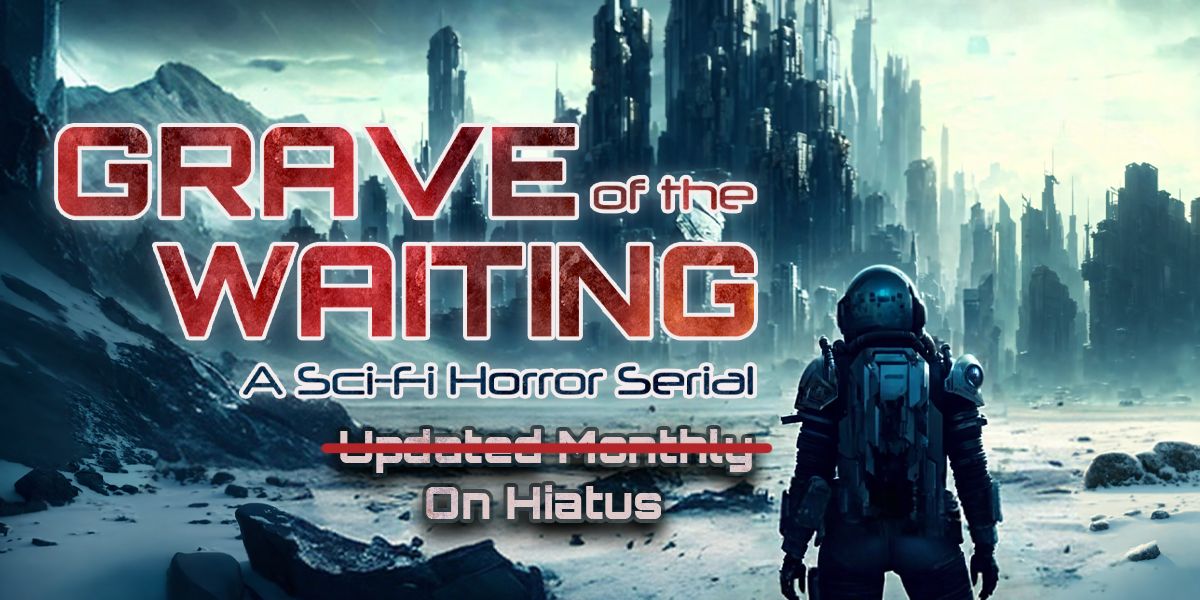
As I said in the Writing Stats section, a significant portion of each month has been dedicated toward preparing each new chapter of Grave of the Waiting. This has caused some problems. Primarily, context-switching between one book and another is a huge productivity killer. Secondarily, all the work needed to put together a monthly chapter release is a ton of stress, which has not helped my situation.
Given the pressing deadlines of Sibling Suns 2, I've made the difficult decision to temporarily pause the release of new chapters. I hoped it wouldn't come to this, but I don't see any other way to get my other writing done in time.
So here's the new game plan for Grave of the Waiting. When I have a free month or two in my schedule, before starting Sibling Suns 3, I will bulk revise all of the chapters at once and write the epilogue. Chapter releases will be much faster after that – either several per month or maybe even just all at once, we'll see. Though the serial is being paused, there's a good chance the whole story will be published faster than it otherwise would have been.
Still, I apologize to those of you who have been reading along each month. Just know that I won't forget about Ada's story – it's near to my heart, and I want to share the rest of it as soon as possible.
Financial Transparency
This is the first time I've run all these numbers myself, so bear with me as I surprise myself at how deep a financial hole I've dug. Before we begin, I'm going to assume this isn't 100% accurate, as one thing I've learned this year is how terrible I am at financial record keeping. I try my best, but things slip through the cracks, I'm sure.
Still, I think it's important to give you an up-to-date accounting of how your money is being spent – yes, your money, because every cent of book earnings goes right back into the next book.
First, some charts from my Amazon and IngramSpark dashboards so we can see how many sales we've got.



As you can see, the vast majority of sales are through Amazon (no surprise there), and the vast majority of those are free eBook downloads (no surprise there either). Those numbers are pretty much in line with my strategy of just getting as many copies out there as possible and not worrying about any financial return.
Let's tally the total copies to date. There's nowhere else to get the Kindle edition but from Amazon, so those charts up there are the full accounting. For paperbacks, sales were through Amazon, IngramSpark, and my website's store (RIP). Here are the totals:
| Amazon | Ingram | JoshSE Store | TOTAL | |
|---|---|---|---|---|
| Paperback Sales | 46 | 19 | 13 | 78 |
| Kindle Downloads | 2919 | 0 | 0 | 2919 |
| Totals | 2965 | 19 | 13 | 2997 |
So, nearly 3000 copies of An Ocean of Others are out there in some form or another. Probably slightly more thanks to free downloads for mailing list subscribers and others who've requested it. Not too shabby!
However, that's not all. In addition to paperback and Kindle orders, we've also got to account for Kindle Edition Normalized Pages (KENP). That's a mouthful – it's just the pages read by people who have Kindle Unlimited.

The book is 490 pages in paperback, so this is the equivalent of roughly 83 more people reading the book. It's not quite that simple, but good enough for our purposes.
But how does any of this translate into financials? The easiest way to figure that out is to look at my business bank account statements. All royalties go straight into that account, and they're the only source of deposits apart from transfers from my personal finances into the business.
The total revenue, after much copying and pasting into Excel – $511.04
In short, I'm not quitting my day job anytime soon! In large part because that's mostly what pays for the books. They don't pay for themselves, not yet. That $500 is incredibly helpful, though! That's an extra $500 I otherwise wouldn't have had to pay an artist or editor, meaning the next book can be that much more awesome.
Now, let's look at the expenses (and try not to cry).

- Ads: $1088.33
- Artwork: $3036.69
- Editing: $1999
- Merchandise: $117.80
- Shipping: $338.75
- Miscellaneous: $927.12
In total, this year's expenses added up to $7500. Not to worry, the business isn't dead – I've got a steady inflow of my own money into the business's coffers. It just isn't profitable yet. And what business is after 9 months? Not many!
Of these categories, the only ones that were paid for out of the business account were Artwork, Editing, and Shipping. Everything else I covered out of pocket.
One thing that's clear to me is those ads have not paid for themselves. I'll probably only resume running ads once the entire series is complete. For now, I'm considering that an expensive experiment! Also, that Miscellaneous category is looking suspiciously unmiscellaneous... I'll be keeping an eye on that to make sure I'm not needlessly spending, because some of the receipts were for things I definitely didn't need (looking at you, acoustic panels for my self-produced audiobook...).
To summarize:
- Books delivered: 2,997
- KENP Read: 41,078
- Revenue: $511.04
- Expenses: $7,507.69
Archefire and Archedark

Phew! If you made it this far and are still with me, I salute you. I barely made it, myself. For this final section, I want to talk about my overall strategy in publishing, because it's something I've been thinking about for quite a while. Before I jump in, just a quick warning that this is going to touch on a contentious topic within the bookish community – namely recent developments in AI. If you're sick of that topic or if you're not really interested in the inside baseball, as it were, feel free to bail out here, and I'll see you next month! 😄
Archefire: "Traditional" Self-Publishing
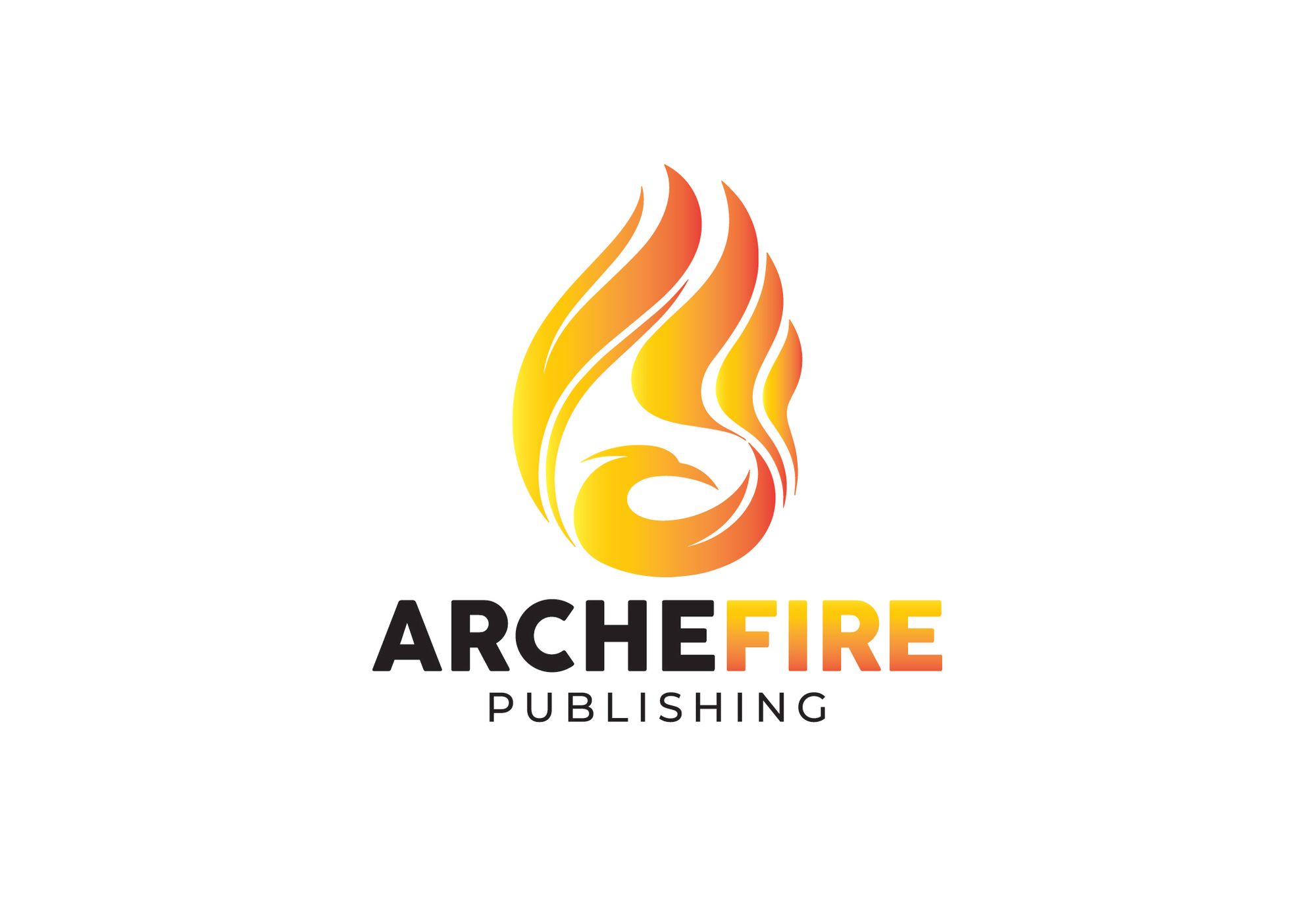
When I first started planning Grave of the Waiting, I knew I wanted to do things differently from how I planned to publish An Ocean of Others. I wasn't sure exactly what that meant, so I pondered it for a bit and came up with a long-term strategy. My idea was to go down two paths simultaneously, the first of which is "traditional" self-publishing.
I intentionally call it "traditional" to evoke the idea of tradpub. We all sort of know that process, since it's very standardized. You need an agent, so start querying. Make sure you do things just so, your query letters must contain all these elements, yada yada. The steps are clear.
Nowadays, the steps for self-publishing successfully are also pretty clear. "Traditional" self-publishing is different from tradpub, but still somewhat standardized. I see it, essentially, as the totality of the "best practices" that have emerged from within the self-publishing scene. It's the wisdom of the crowd, and it's constantly evolving. Faster than tradpub evolves, that's the important part.
I don't proclaim to be all-knowing, but here are just a few of the nuggets of advice I often see thrown around and which I followed for publishing An Ocean of Others:
- Your cover art matters A LOT, make sure it's great
- Most readers use Amazon, so enroll in Kindle Unlimited if you plan to mostly sell eBooks
- Get an ISBN and copyright
- Lower the barrier to entry if you're a new author – price your eBook at $0.99
- Promote your book on social media
- Create a website and mailing list
Now, advice comes in a few categories: 1) universal advice, 2) conditional advice, 3) bad advice. None of the above would I categorize as bad advice. Having good cover art I would say is fairly universal in today's day and age – it's hard to grab someone's attention without it. The rest I would classify as conditional advice.
Get an ISBN and copyright? What if you're publishing fan fiction? Can you even get a copyright?
Promote your book on social media? Plenty of authors are successful without social media (and frankly, I don't know how they do it).
Price your eBook at $0.99? Again, I've seen authors who don't follow this and do just fine.
Like I said, they're not universal, but they're still good pieces of advice. It's easy to see why they've become common practices in the industry. They apply to many people, and they work reasonably well.
But what if some other combination of strategies could work better? We can't know that unless we explore the possibility space. Which is why I'm traversing another path as well.
Archedark: Experimental Self-Publishing
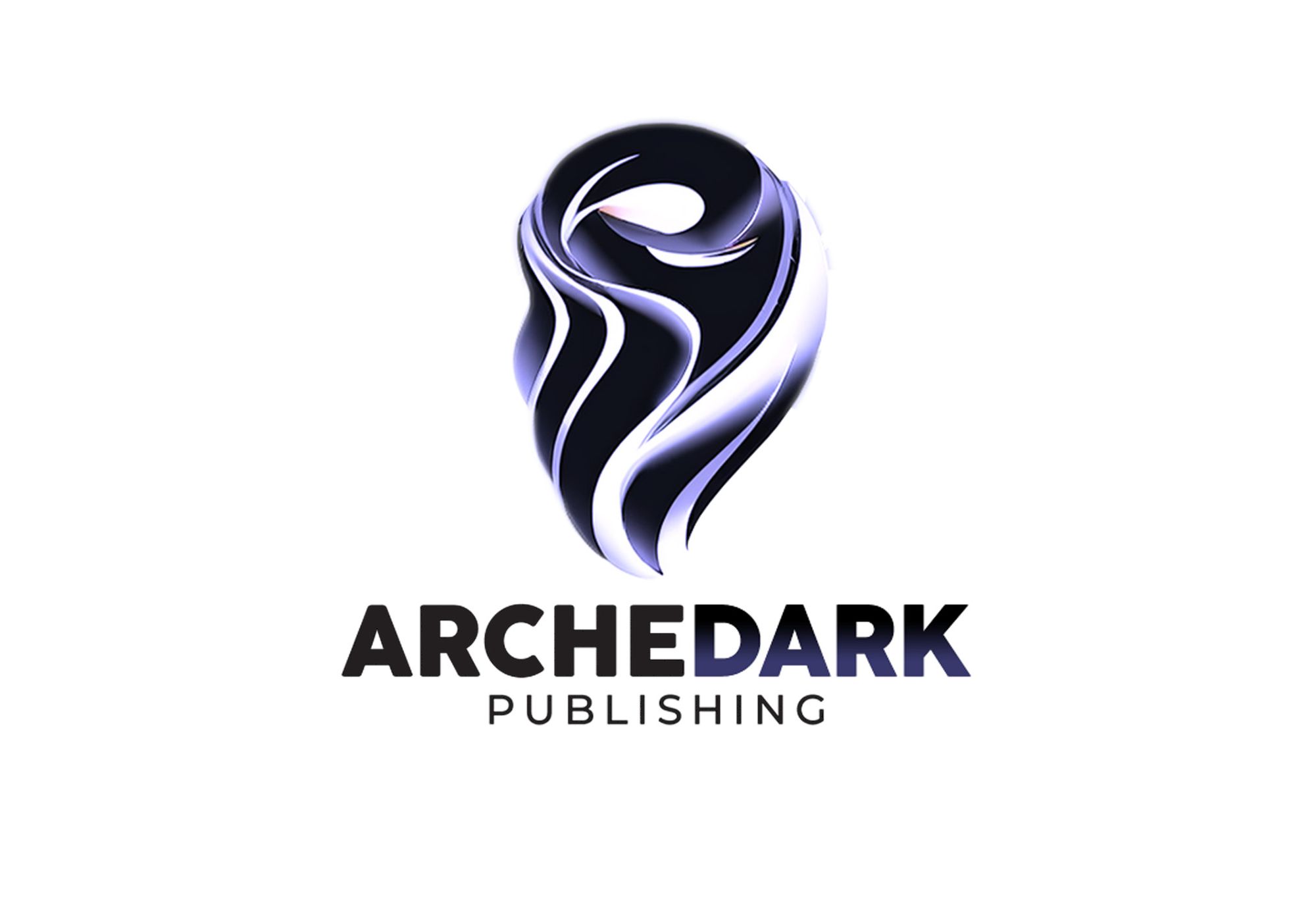
Traditional self-publishing evolves faster than tradpub. Experimental self-publishing should evolve faster than traditional self-publishing. Ideally, this is something we should all be doing, and which many in the community already are: exploring the possibility space and sharing our results with the wider community.
This doesn't have to be done in any formal way. Just chatting with other authors about cool stuff you're doing and how it's working for you, that'll do the trick. Maybe it will inspire them to try something new themselves, to add a twist to your idea. Or perhaps it will serve as a cautionary tale. This is how most of the best practices of our industry came about in the first place.
There's no authoritative source of knowledge about how best to self-publish your work. There are only individual people noticing what works and doing more of that, noticing what doesn't work and doing less of that. That, plus talking to each other, is how self-publishing became the billion-dollar industry it is today.
We should be doing more of this. Trying things that go against the best advice of the community. Shirking norms. Experimenting with new ideas. That rebellious nature so inherent to our scene is the main reason I chose to self-publish. To me, that's the sign of a healthy community: divergent strategies plus feedback to integrate successful ones into the common wisdom. Experimentation is the source of thriving. Adaptation is the key to survival.
Things are rapidly changing in our world, especially with regard to technology and the platforms we use, that might make the traditional self-publishing route more difficult. We're going to have to adapt. The obvious disrupter is AI, which is poised to transform virtually every industry on Earth. I can share my reasons for why I think widespread use of AI is inevitable in a separate post if there's interest, but just take that as a given for the purposes of a thought experiment.
Say we have no choice about living in a world where powerful AI tools have mass market adoption. What would we want that world to look like? Perhaps, in reality, this will not be the case, but just assume it is for now. How should people be using AI in that world? What are the risks and benefits, the potential harms?
To answer those questions, you would need to know what the tool is capable of. Regardless of what your goals are – to maximize AI use or to shut it down completely – you should want to know what it can do. Some may ask, why would someone who doesn't want AI to be used need to know its capabilities? You'll be much more likely to succeed, for one, if you can more precisely critique it. It would also allow you to more effectively legislate the technology.
To learn what a tool is capable of, you have to use it. It's the only thing that's ever worked for me – I learn by doing. However, I know people have ethical and other heartfelt concerns about the use of AI, questioning whether AI-generated content counts as art, how data for the model is collected, and how it will affect the livelihoods of artists. I have skin in the game; the last thing I want to see is this technology worsening the conditions for artists and other services within our industry's ecosystem.
I acknowledge all of those concerns as valid, and I'm positive my list is not exhaustive. We're still learning about this technology and what it means to live in a world where it exists. That's okay. As we uncover more and more of that answer, we can use that information to think more deeply about how this technology can be used in ethical ways and how we can guide its proper use. The question of what constitutes ethical use remains open.
Let's revisit the thought experiment. A world where AI is ubiquitous – what would we want that world to look like? Keep the slice of the world we're picturing small, confined to our industry. Change is unpredictable, so we can't be too specific here, but one thing I want is for artists and authors to thrive because of the technology. I want it to be uplifting, to empower people to express themselves in more ways than ever. I also want authors and artists who don't embrace the technology to thrive. I want it to be an addition, not a replacement.
If AI-generated content is going to be in addition to human art, content labels are going to be required. They're different services requiring different skillsets and time commitments. Without labels, it's too easy for the AI-artists to masquerade as traditional artists and charge premiums for labor they're essentially not doing. AI detection software, in my opinion, is a non-starter. At best, I think we get an arms race scenario, but I don't put much stock in those tools. Their error rates are too high for them to be reliable. More likely we're going to get AI labels embedded in files as standard tools like Photoshop gain AI generation capabilities (as the current beta has).
My power to shape events is paltry compared to industry giants like Adobe, but if labels are needed, even small businesses are going to have to make clear their policy on AI use and labeling. Consider this piece my own business's statement on AI use:
- When I use any AI tools on a project, it will be labeled as an Archedark project.
- If, on the other hand, it's labeled as an Archefire project, I guarantee it's free from AI use. All artwork for those books will be commissioned from human artists not using AI tools, and I'll be diligently ensuring that's the case.
I also won't be using AI to generate any writing for Archefire books. In Archedark books, rarely and only if I can use it in some clever, creative way. I'm in this community because I love stories, and the act of writing them is good for my squishy gray neurons. I'm not going to be pumping out 97 books per year – where's the fun in that? I don't think I'd be able to actually care about my characters if I spent so little time with them.
Archedark projects are the experiments. Grave of the Waiting was my first, and I have used AI to generate the feature images for each chapter. I've been fairly open with that, talking about it in my writing update videos all the way back in the bygone era of August 2022. Things weren't nearly so contentious then. But if labels are the way forward, I might as well retroactively label some things. There's also the cover art, of course, which I talked about in the March 2023 newsletter. None of the writing has been AI-generated, but I did use GPT-4 to help with the revision guide on the last two chapters. I can share further details with anyone who wants to know. All this to say, it's been no secret I've used AI on that project, but I wanted to make it more explicit since this topic seems to be taking up so much wind.
At the moment, given the legitimate concerns that the training data for AI models often contain copyrighted material and can be sourced in ethically questionable ways, I'm not comfortable charging money for Archedark projects. As we see more ethically sourced models emerge, such as those trained with opt-in datasets, I may start asking a reasonable price. All revenue generated by Archedark projects will go directly toward supporting artists for the AI-free Archefire projects. If you have a personal stance against AI and don't want to buy an Archedark book, I respect that decision and hope you'll consider an Archefire book instead. My goal is for both kinds of projects to support the artists in our ecosystem.
I understand everyone is going to have a different personal policy for what use of AI is acceptable, ethical, what-have-you. Some of those policies may conflict or make it harder for certain people to work together. Still, I think it's better to be upfront about these things so there are no surprises or mismatched expectations.
We're all trying to figure out how to live with this new thing that just showed up on humanity's doorstep. We're not sure how drastically things will change. The only certainty is that change is coming, in some form or another. We had best be ready for it. To quote a fantasy great:
You have to be realistic about these things.
– Joe Abercrombie, Last Argument of Kings
Much of this hinges on your perception of my own honesty. How do you know I'm not using AI tools to produce Archefire books? For starters, I hope explaining this policy gains me some measure of trust. I also know it will likely invite greater scrutiny. As some old guy said, "trust, but verify." I have ideas how to handle that verification, but I'm still open to ideas so I'll turn the question around on you. What level of verification would it take for you to trust a work isn't AI-generated? Patrick Samphire had a good thread where authors were kicking around ideas:

I'd love to hear your own answers. If, after reading all this (God bless you if you truly did), you want to shout profanities at me, I direct you to my anonymous feedback form:
The rest of you are welcome to chat me up on Twitter or email. 🙂 I'm in the software industry, so I'm trying my best to stay on top of this new emergence. Things, however, are moving faster than any human can reasonably keep up with, so I'm curious to hear everyone's experiences. What is your thinking in this area? Are you a strident believer that AI content can never be art? Do you think it's a fad that will go away, like NFTs? Or maybe you don't think there should be any distinction made, no labels necessary.
Whatever your opinions, discussion is healthy, especially in disagreement. Just be kind to one another, keep your hearts open, and perhaps we can get a little bit closer to that ideal world from our thought experiment. Because this doesn't have to be zero-sum. Let's think win-win instead.
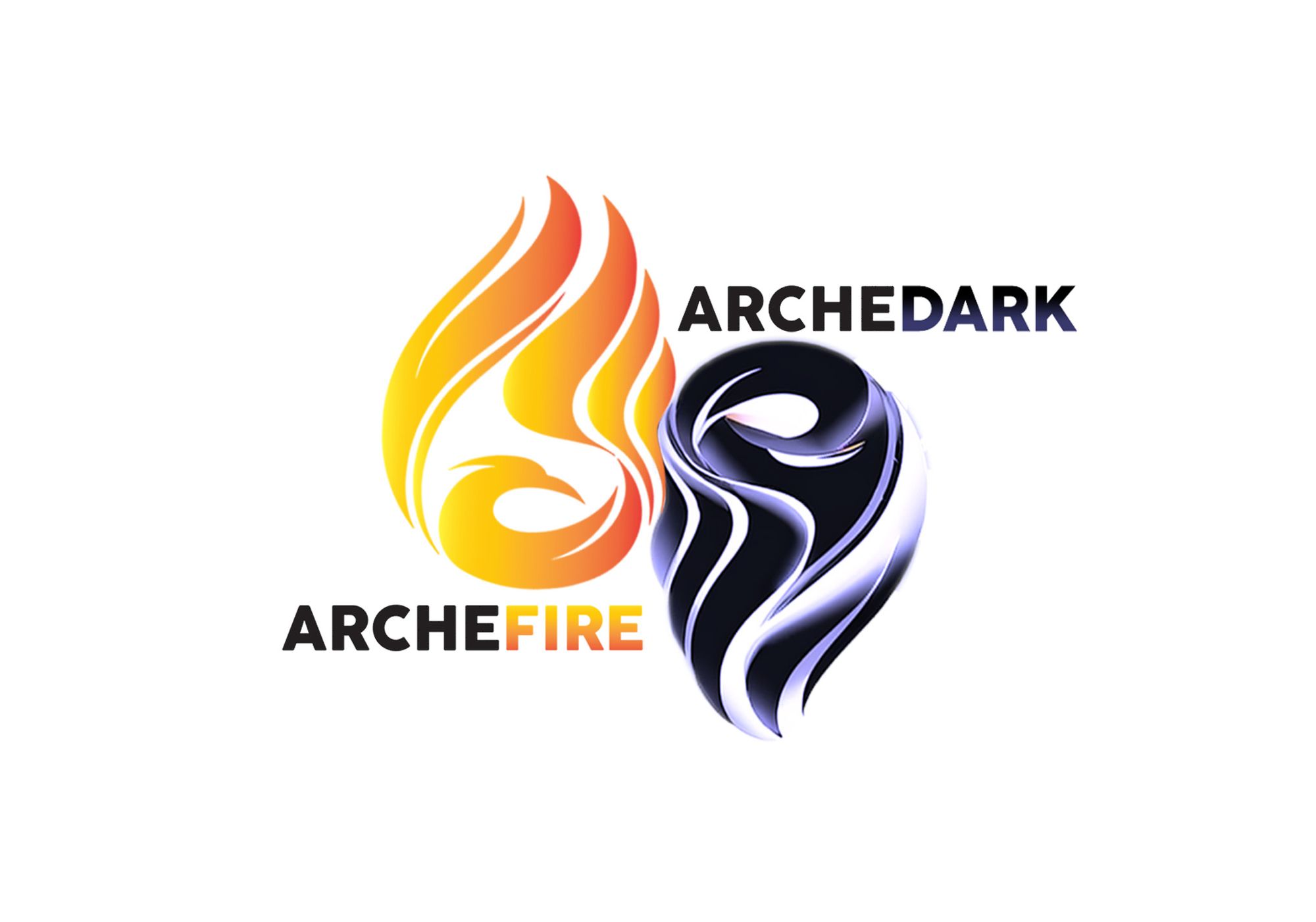
You see? I told you there was an absurd amount of content in this newsletter. That was hours ago! At least, from my perspective. I wrote this entire thing over the course of a single 9-hour writing session. You deserve a prize if you made it this far, and I deserve a reward for darn sure.
Here it is! I mentioned this earlier: my wife and I are getting a puppy! Look:
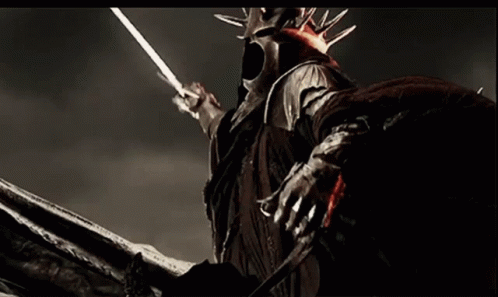
Wait, hold on. Wrong picture. Here he is.

Behold! Nazgul, the miniature schnauzer, whose pictures will be gracing your inbox each month. He will require you to kneel, so don't hesitate in bowing down before him.
Isn't he cute? I already love him.
Sadly, that's the only picture I have of him, so that's all for this month. Thanks so much for all the kindness you've shown me since the release of An Ocean of Others – it's been a year I'll never forget. I hope you're still around for next year's big update. Until then, we've got eleven small ones to go. See you in July, and as always, thanks for reading!

